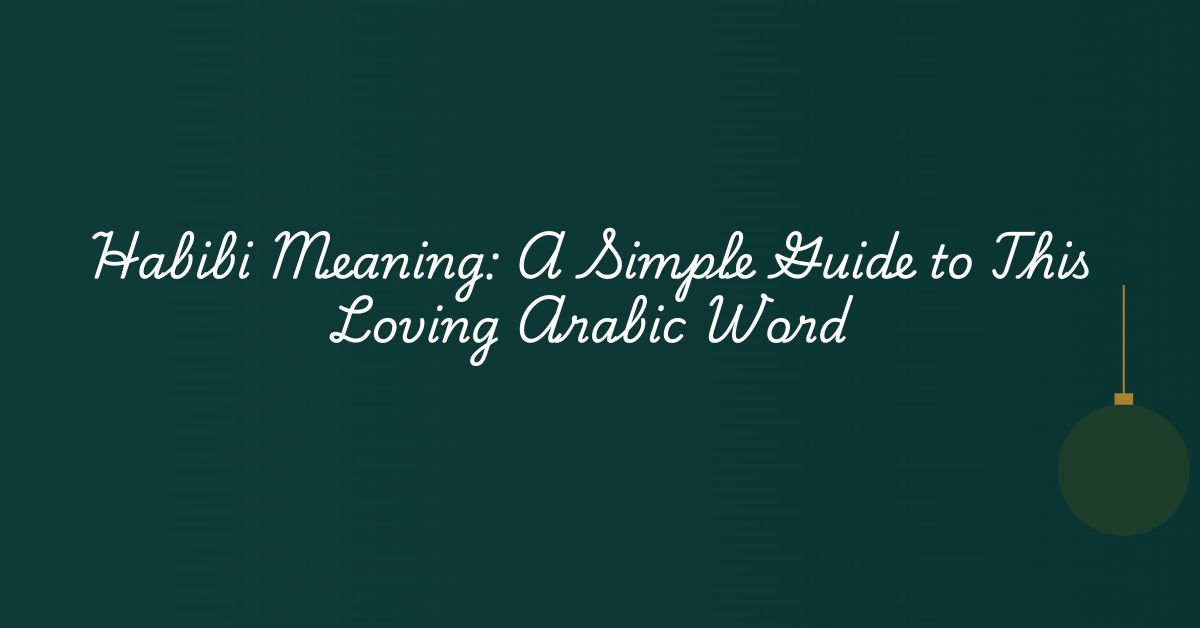Habibi is a popular Arabic word that means my love or my dear. It’s often used to express affection toward friends, family, or romantic partners. Many people wonder, what does habibi mean? It’s a warm and loving term that adds a personal touch to conversations. You might hear phrases like yalla habibi meaning let’s go, my dear, which is common in daily Arabic speech. The beauty of habibi is its versatility—it’s used in songs, movies, and everyday chats.
So, what does habibi mean beyond its literal translation? It’s more than just a word; it’s a cultural expression of love and friendship. Habibi meaning carries warmth and connection, making it a favorite worldwide. Whether in casual or romantic settings, habibi makes conversations feel more personal. Next time someone says yalla habibi, you’ll know it’s a friendly, affectionate phrase!
Unraveling the Meaning of Habibi
Habibi holds deep cultural value. The word expresses affection and endearment in Arabic-speaking communities. Used for close friends, family, and loved ones, it creates warmth in conversations.
People also say Hababa as a variation, especially when speaking to females. Songs, movies, and daily speech include this special word. Understanding the term’s emotional and relational significance helps appreciate its true meaning.
Different cultures have also adapted and personalized Habibi. It appears in casual chats and formal settings alike. Many use it in friendly greetings and romantic expressions.
Language and emotion blend beautifully in Habibi, in this simple yet powerful word. The meaning remains strong across different contexts.
Learning its proper use adds depth to communication. The charm of Habibi continues to spread globally.
Embracing Habibi in Conversation
Meaning of Habibi is important in Arabic culture. It expresses love, care, and friendship. Family members, friends, and partners often use it. This word creates warmth and closeness between people.
Different situations require different ways of speaking. Tone, context, and audience decide how Habibi is used. In casual talks, it sounds friendly. In deeper conversations, it carries stronger emotions. Understanding this helps in proper usage.
Close friends and family use this word a lot. Intimate settings among individuals with a shared cultural background make it more personal. It strengthens relationships and shows deep feelings. Using it correctly avoids misunderstandings.
Some situations need more care. Formal or cross-cultural contexts require respect and awareness. Not everyone understands Habibi the same way. Using it wisely makes conversations smoother. Learning its meaning helps in communication.
The Cultural Significance
Habibi is a special word in Arabic. It expresses love, care, and deep affection. Friends, family, and couples use it in daily conversations. The word carries warmth and kindness. Many people across different cultures now use it too.
Many songs include Habibi to express emotions. Arabic music often features this word in love songs. Singers use it to show longing, passion, and deep feelings. It makes songs more meaningful and touching. Listeners connect with the word because of its emotional depth.
Poetry and storytelling also highlight this word. Literature in Arabic includes Habibi to express relationships and emotions. Writers use it in romantic stories and poems. It makes the writing more beautiful and heartfelt. The word strengthens the connection between the reader and the text.
People often use Habibi online. Social media platforms are full of posts, captions, and comments with this word. It helps users express care and friendship. People worldwide have started using it in messages and conversations.
This word is more than just a name. It represents culture, love, and tradition. Understanding Habibi helps in learning more about Arabic customs and expressions.
You’ll Love: 99+ Adjectives Start with Y: Words That Start with the Letter Y
Synonyms and Alternatives Word
Habibi is a beautiful term of endearment, but it is not the only way to express affection. Many other words can show love and care. These words may have different meanings but carry similar warmth and tenderness.
Here are some synonyms for Habibi, along with their meanings:
- My love: A universal term of affection, often used in romantic relationships to express deep feelings.
- Darling: A classic word conveying tenderness and care, often used in romantic or close relationships.
- Sweetheart: A warm, affectionate term used for a romantic partner or close loved one.
- Beloved: A more formal term that expresses deep, respectful affection, often used in literature or poetry.
- Honey: A casual, playful term of endearment, often used in romantic contexts, similar to Habibi.
- Dear: A simple yet heartfelt term used to show affection, often in both romantic and non-romantic settings.
- Lovebug: A sweet, playful term of endearment, often used between romantic partners or close friends.
These synonyms all carry warmth and love, similar to Habibi, but with slight differences in tone and usage.
Antonyms of Habibi
While Habibi conveys warmth and affection, its antonyms represent distance, unfamiliarity, or hostility. Here are some antonyms for Habibi:
- Stranger: A person you don’t know well, someone with whom you don’t share close ties.
- Enemy: A person with whom you have hostile feelings or conflict, the opposite of love or affection.
- Acquaintance: Someone you know, but with whom you don’t share the close, affectionate bond that Habibi expresses.
- Rival: A person you compete with, often implying negative feelings or opposition.
- Outsider: A person who is not part of a group or community, someone who lacks the intimate connection implied by Habibi.
These terms reflect a lack of closeness, affection, or familiarity, standing in contrast to the deep, emotional connection that Habibi symbolizes.
Who Uses Habibi?
Habibi is commonly used by Arabic speakers, but it has crossed cultural boundaries. Many people worldwide, especially those familiar with Arabic-speaking communities, use the term.
In countries with large Arabic-speaking populations, Habibi is often heard in everyday conversations. It’s a common term of endearment in the Middle East and North Africa. People use it to show affection to family, friends, and romantic partners.
Due to the influence of Arabic music, films, and social media, Habibi has become known beyond Arabic-speaking countries. Non-Arabic speakers now use it, especially in casual or affectionate contexts. For example, you may hear it in pop songs or see it in social media posts, reinforcing its global presence.
Though Habibi is popular in Arabic culture, anyone can use it with respect, as long as they understand its emotional and relational significance. It’s a warm term that can help build connections and express affection across cultures.
When to Use Habibi in Conversation
Understanding when to use Habibi is key to using it appropriately. This term of endearment is versatile and can fit into different types of conversations. Here are some common situations where it’s naturally used:
- Expressing Love in Romantic Relationships
In relationships, Habibi is often used to express affection, much like “dear” or “sweetheart” in English. It adds warmth and closeness between partners.
Example: “I miss you, Habibi. Can’t wait to see you again!” - Showing Affection in Families
Within families, Habibi is a loving way to address children, parents, and siblings. It helps create a strong, emotional connection.
Example: “Be careful, Habibi. I’ll be right here.” - Using it Among Friends
Close friends use Habibi to express fondness, similar to saying “buddy” or “pal.” It adds a playful and affectionate tone to friendships.
Example: “Hey, Habibi, how’ve you been?” - Casual Conversations and Greetings
In everyday conversations, Habibi adds warmth. It’s commonly used in phrases like “Yalla, Habibi,” which means “Let’s go, dear.”
Example: “Yalla, Habibi, let’s grab some coffee.” - Comforting or Offering Support
When someone feels down, calling them Habibi can bring comfort and show empathy.
Example: “Don’t worry, Habibi. You’ve got this.”
In these situations, Habibi helps convey affection and adds a personal touch to communication.
You’ll Love: 105+ Adjectives Start with K: Words That Start with the Letter K
Responsible and Mindful Usage of Habibi
Using Habibi requires careful consideration. It’s important to know when and how to use the term so it remains respectful and genuine. In the wrong setting, it could be seen as overly familiar or inappropriate. Understanding the context in which you’re using Habibi helps avoid misunderstandings.
One of the key aspects of using Habibi responsibly is understanding the relationship you have with the person. Habibi is often used among close friends, family, or romantic partners. Using it with someone you don’t know well might be uncomfortable for them. It’s a term meant for those with whom you share affection or deep respect.
Cultural awareness is also important. In Arabic-speaking countries, Habibi is a term of endearment that carries emotional weight. In these cultures, using it out of context or inappropriately can be seen as disrespectful. Be sure to learn the norms of the culture when addressing others with Habibi.
Overusing Habibi can lead to it losing its meaning. Like any term of endearment, it should be used sparingly to preserve its value. If said too often, it might not come across as sincere. Only use it when it truly reflects your feelings or the nature of the relationship.
Finally, the tone and delivery of Habibi matter. Whether said with warmth or comfort, your tone should match the sentiment you want to express. If it’s used with a dismissive or sarcastic tone, the term could lose its affectionate value. So, it’s important to always be mindful of how you say it.
FAQs
Can “Habibi” Be Used for Strangers?
“Habibi” is usually used with close friends, family, or romantic partners. It may not be appropriate for strangers, as it can seem too personal.
What’s the Difference Between “Habibi” and “Habibti”?
“Habibi” is used for males, while “Habibti” is used for females. Both terms mean “my dear” or “my beloved” in Arabic.
Can “Habibi” Be Used Outside of Arabic-speaking Communities?
Yes, Habibi can be used outside Arabic-speaking communities, but it’s essential to understand cultural context and ensure it’s appropriate for the relationship.
Is Habibi for a Boy or Girl?
“Habibi” is typically used for a boy or man. The female version is “Habibti,” used to address a woman or girl.
What Does Habibti Mean to a Girl?
“Habibti” means “my dear” or “my beloved” when used to address a girl, conveying affection, warmth, or love in Arabic-speaking cultures.
Is Habibti Romantic?
Yes, “Habibti” is often used romantically, but it can also express deep affection in familial or friendly relationships depending on the context.
Final Thoughts
As an English teacher, I love how language can connect people, inspire them, and change the way we see the world. It’s been so fun exploring the word “Habibi.”
This special word shows just how rich and diverse different cultures are. It also shows how language helps us express our feelings and build connections.
By learning about the meaning, use, and importance of Habibi, we can all become better communicators. It’s important to use words thoughtfully and responsibly.
Whether you’ve been using Habibi for a while or you’re just learning about it, I hope this article has given you new insights and made you appreciate the beauty of language even more.
The most important thing is to use these words with respect and understanding. Embrace the love and warmth that Habibi carries, but always be aware of its cultural meaning and impact.

